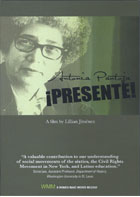
Antonia Pantoja: Presente 2009
Distributed by Women Make Movies, 462 Broadway, New York, NY 10013; 212-925-0606
Produced by VOCES Public Broadcast Television
Directed by Lillian Jimenez
DVD, color, 53 min.
Jr. High - Adult
Activism, Education, History, Immigration, Latino Studies, Women's Studies
Date Entered: 07/02/2010
Reviewed by Linda Alkana, Department of History, California State University Long BeachThis informative bio-documentary is part of Public Broadcast Television’s VOCES series, which is devoted to showcasing Latino culture. It focuses on the life and contributions of Dr. Antonia Pantoja (1922-2002), an educator, activist, inspiration to Puerto Rican youth and Presidential Medal of Freedom recipient. It traces her activism on the part of Puerto Ricans from her childhood in Puerto Rico, where she learned about activism from her family’s participation in labor protests against the tobacco industry, through her successful court case in New York on behalf of bi-lingual education, to the foundation of ASPIRA, “the first Puerto Rican owned and controlled organization in the United States” dedicated to offering hope, education and leadership training to Puerto Rican youth.
The film features voice-overs and talking heads that complement the home movies and archival footage that give a sense of the positive changes in opportunities for Puerto Ricans in the continental U.S. that Pantoja was, in part, responsible for.
The film argues successfully that Antonia Pantoja was a “legendary” and “visionary” figure who “inspired others to dream.” It presents her life and activism in a historical context, where she was part of the massive movement of Puerto Ricans to New York after World War II that faced prejudice and limited opportunities upon arrival, and whose children played on the rooftops of Harlem, while the newspapers wrote of an increasing Puerto Rican “problem.”
Interviews of successful ASPIRA alumni demonstrate the changes Antonia Pantoja brought about through organizing New York Puerto Rican youth around education and leadership.
Educators can welcome this documentary for both its demonstration of the importance of education for social advancement, as well as its presentation of the challenges non-English speaking Americans face in society.